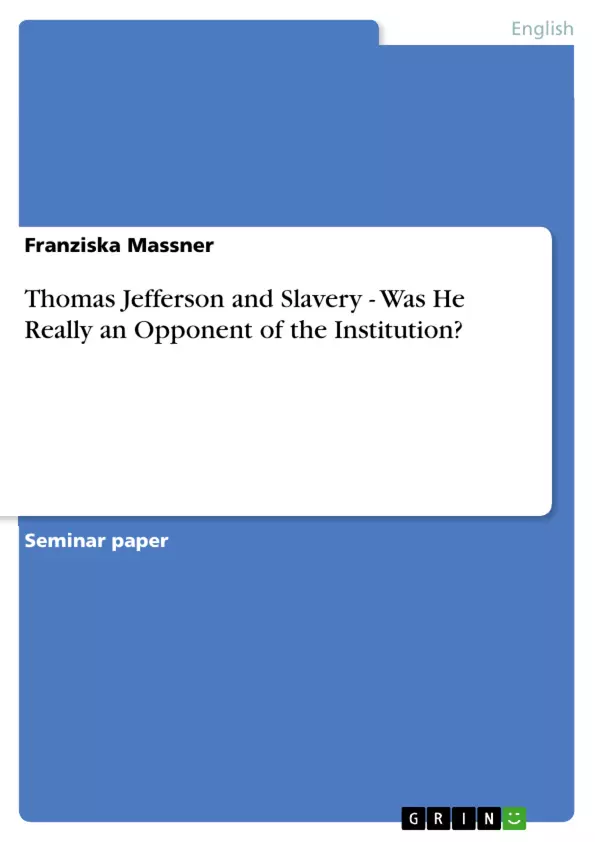1. Introduction
“We hold these truth to be self-evident, that all men are created equal, that they are endowed by their Creator with certain unalienable rights, that among these are life, liberty and the pursuit of happiness. […]” These are the words Thomas Jefferson became famous for. For many people he is the father of liberty in the United States. What most people forget is that at Jefferson´s time “all” meant only the white society. His words did not include blacks. The man who proclaimed liberty already possessed over 150 slaves when he wrote the Declaration of Independence. Throughout his life he always condemned slavery in theory, but in practice he died as a slaveowner, having done nothing to ensure the right of liberty to them. Jefferson´s ideas about slavery were complex and ambiguous. On the one hand, his words were those of an abolitionist who would do everything to end slavery. On the other hand, he was only an ordinary slaveowner who bought and sold slaves and never tried to end slavery seriously. In fact, Jefferson did many things for his country people rightly admire him for. He helped to create and build the United States and used his political power to establish democracy and freedom among his people. But when it comes to slavery, there is nothing really to admire about Jefferson. He proposed liberty, but stayed a slaveowner during his life. This paper will deal with Thomas Jefferson´s attitude towards slavery. It will show that he never really acted on his words and try to explain the reasons for his inactivity. Therefore it is necessary to speak about the economic and political background of Jefferson´s time as well as his attitude towards blacks as a race first. The second part will show why Jefferson condemned slavery theoretically and for what reasons. The third part will deal with the actions of Jefferson concerning the issue of slavery.
1 http://federalistpatriot.us
2 Paul Finkelman. Slavery and the Founders. (New York: M. E. Sharp, 1996) 105.
Table of Contents
- Introduction
- Economic, Political and Social Background
- Economic Background
- Political Background
- Jefferson's Attitude towards Blacks
- Thomas Jefferson's View on Slavery
- Danger of a Mob
- Danger of Slave Revolts and Civil War
- Slave Trade
- Slavery as an Evil of American Society
- Jefferson's Actions on Slavery
- The Young and the Old Jefferson
- Manumitting His Slaves
- Conclusion
Objectives and Key Themes
This paper aims to examine Thomas Jefferson's stance on slavery, highlighting the disconnect between his words and actions. It will explore the economic and political context of his time, his views on the African American population, and the reasons for his inaction regarding the abolition of slavery.
- The economic and political context of slavery in the American South
- Jefferson's theoretical condemnation of slavery
- The complexities of Jefferson's views on slavery
- The reasons for Jefferson's inaction regarding the abolition of slavery
- The contrast between Jefferson's words and actions
Chapter Summaries
- Introduction: Introduces the topic of Thomas Jefferson's attitude towards slavery, highlighting the contradiction between his advocacy for liberty and his ownership of slaves. It outlines the paper's structure and objectives.
- Economic, Political and Social Background: This chapter delves into the economic and political conditions of the American South, focusing on the importance of landownership and the prevalence of plantation agriculture. It examines the role of slavery in the southern economy and its impact on the social structure of the time.
- Thomas Jefferson's View on Slavery: This chapter examines Jefferson's theoretical arguments against slavery, exploring his concerns about the potential for slave revolts, the moral implications of the slave trade, and the negative impact of slavery on American society. It delves into the complex nature of his views on the issue.
- Jefferson's Actions on Slavery: This chapter investigates Jefferson's actions concerning slavery, contrasting his pronouncements against the institution with his continued ownership of slaves. It explores the factors that may have contributed to his inaction on the issue.
Keywords
The paper explores the complex relationship between Thomas Jefferson, slavery, and the American South. It examines key themes such as the economic and political realities of the time, Jefferson's theoretical arguments against slavery, his personal ownership of slaves, and the reasons for his inactivity concerning the abolition of slavery. The analysis focuses on concepts like the contradiction between words and actions, the role of slavery in the Southern economy, and the evolving views on race and equality in early America.
Frequently Asked Questions
Was Thomas Jefferson an opponent of slavery?
Theoretically, yes. Jefferson often condemned slavery in his writings as an "evil." However, in practice, he remained a slaveowner throughout his life and held over 150 slaves when writing the Declaration of Independence.
How did Jefferson's views on race influence his actions?
Jefferson held complex and often prejudiced views towards Black people as a race, which contributed to his belief that immediate emancipation without colonization was not feasible.
Why didn't Jefferson free his slaves?
Reasons included his significant personal debts, the economic dependence of the plantation system, and his fears of social instability or civil war if slavery were ended abruptly.
What was the contradiction in the Declaration of Independence?
The Declaration states "all men are created equal," yet Jefferson, the primary author, excluded Black people from this definition of liberty in his contemporary practice.
What were Jefferson's fears regarding slave revolts?
Jefferson was deeply concerned about the "danger of a mob" and potential violent uprisings, which he believed made the issue of slavery a "fire bell in the night" for the young nation.
- Quote paper
- Franziska Massner (Author), 2005, Thomas Jefferson and Slavery - Was He Really an Opponent of the Institution?, Munich, GRIN Verlag, https://www.grin.com/document/52806



